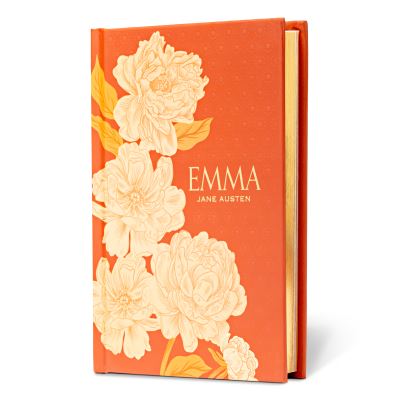LoveReading Says
While Pride and Prejudice may sit at the top of many people’s favourite Jane Austen books, Emma has to be a contender for the title too. For me Emma has a little more bite, it isn’t quite as comfortable a read as Pride and Prejudice, and that makes it more interesting. In terms of lead characters Emma is right up there, she may be headstrong, snobbish, convinced she knows best, yet because of those characteristics, because she isn't perfect, she also feels so very real. Emma is a bright, beautifully written novel with real heart and I love it.
Visit our '50 Classics Everyone Should Read' collection to discover more classic titles.
Visit our 'Women's Words - 60+ works of feminist-minded fiction' to explore our collection of feminist-minded fiction from around the world, and across centuries.
Liz Robinson
Find This Book In
Emma Synopsis
Discover the story of Jane Austen's Emma with this exquisite edition from Union Square & Co.'s Signature Gilded Editions series! The stunning Emma special edition features sprayed edges, color end pages, a built-in ribbon bookmark, and embossed foil cover. The beautiful design and attention to detail set this special edition book apart, whether you're reading for the first time or building a library of your favorite classic literature books. Handsome, clever, and rich, Emma Woodhouse delights in interfering in the romantic lives of others. But when she ignores the warnings of her good friend Mr. Knightley and attempts to arrange a suitable match for her protégée, Harriet Smith, her carefully laid plans soon unravel and have consequences that she never expected. Though not widely recognized during her lifetime, Jane Austen has become one of England's most renowned novelists. Born in 1775, Austen lived a quiet life and began writing in her youth, though she did not publish until 1811 with the anonymous release of Sense and Sensibility. This was followed by three novels before her death in 1817: Pride and Prejudice (1813), Mansfield Park (1814), and Emma (1816). Austen is known for her satirical portraits of social customs and marriage rituals, though she wrote during the passionate Romantic period. Some view her as aligned with earlier eighteenth-century ideals of reason and propriety. However, her witty heroines also reflect an emerging feminism and intelligence that contrasted with women's confined roles. While her endings espouse marriage, novels like Emma provoke questions about women's fulfillment and Austen's own views. Through her rich domestic portraits and investigations of social mores, Austen captured the constrictions on women's lives with insight that still resonates centuries later.
About This Edition
About Jane Austen
Jane Austen was born on 16 December 1775 at Steventon near Basingstoke, the seventh child of the rector of the parish. She lived with her family at Steventon until they moved to Bath when her father retired in 1801. After his death in 1805, she moved around with her mother; in 1809, they settled in Chawton, near Alton, Hampshire. Here she remained, except for a few visits to London, until in May 1817 she moved to Winchester to be near her doctor. There she died on 18 July 1817.
As a girl Jane Austen wrote stories, including burlesques of popular romances. Her works were only published after much revision, four novels being published in her lifetime. These are Sense and Sensibility (1811), Pride and Prejudice (1813), Mansfield Park (1814) and Emma (1816). Two other novels, Northanger Abbey and Persuasion, were published posthumously in 1818 with a biographical notice by her brother, Henry Austen, the first formal announcement of her authorship. Persuasion was written in a race against failing health in 1815-16. She also left two earlier compositions, a short epistolary novel, Lady Susan, and an unfinished novel, The Watsons. At the time of her death, she was working on a new novel, Sanditon, a fragmentary draft of which survives.
Fellow novelist Katharine McMahon on Jane Austen...
I can't not choose her. And whichever I've read last is always my favourite. The nuance of emotion, the understanding of human nature revealed by Austen constantly delights me. When I reread Sense and Sensibility recently, for the first time Elinor came across as quite prissy and destined to marry a rather spineless husband. I wonder if that was intended?
More About Jane Austen
